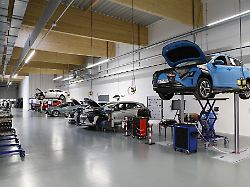Location advantage in Europe
Hyundai sees competition from China “far ahead”
02/09/2023, 8:25 p.m
On the German market, Hyundai took first place among the Asian import brands in terms of market share last year. Thanks to location and strategic advantages, the Korean carmaker sees itself armed against the competition from the Far East, which is penetrating the European market.
The Korean carmaker Hyundai is confident in dealing with the Chinese competition that is pushing towards Europe. “We can say with confidence that we have many competitive advantages, so I’m relatively relaxed about the matter,” said Jürgen Keller, Managing Director of Hyundai Motor Germany, to journalists. He emphasized the dealer network with around 500 locations as an advantage. Hyundai trains employees in sales and service in a recently opened training center in Hösbach, Lower Franconia.
At the location not far from Aschaffenburg, up to 10,000 employees are to be trained by contractual partners every year. “These are things that you can’t build up overnight. We’re way ahead of them,” emphasized Keller. Hyundai takes Chinese automakers seriously. “But they often forget that customers sometimes want to have a contact person.” When it comes to service, not everyone can imagine that their car will be picked up and returned at some point, as some Chinese carmakers do. Not every customer wants to do things directly online without first contacting a consultant.
When asked about the latest price cuts by the US electric car manufacturer Tesla, the Hyundai CEO replied that he did not expect a price war in Germany. Demand is still higher than supply. “Many of our competitors have already sold their entire electric range for this year. If you order an electric car today, it won’t come until 2024.”
From 2026, Hyundai wants to offer all model series in Germany with alternative drives. The Federal Motor Transport Authority (KBA) understands this to mean both purely battery-powered cars and hybrid cars (including plug-ins) and fuel cell vehicles that run on hydrogen. By 2035, when no new combustion engines are allowed to be registered in Europe, the Korean carmaker wants to only offer battery-electric vehicles and cars with fuel cells.
On the German market, Hyundai achieved a market share of four percent last year with a good 105,000 new passenger car registrations. This puts the carmaker in first place among Asian import brands, ahead of Toyota and sister company Kia. For purely battery-powered cars, Hyundai is in third place behind Tesla and VW.
